★★½
“Because ‘Killing Asian model of few words’ wouldn’t fit on the DVD sleeve.”
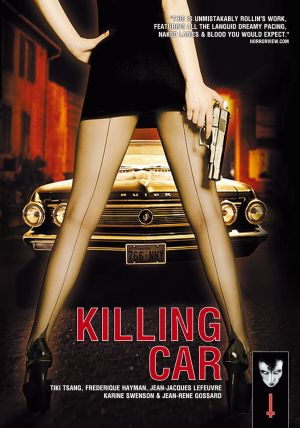 This is a surreal revenge thriller, which begins at a scrapyard where the bickering of a couple is interrupted by an Oriental woman (Tsang), who shoots them dead and takes a car. A series of similar encounters follows, which take a similar form: we are introduced to one or more characters; then the woman shows up, and kills them, leaving a toy car behind at the scene as a marker. This includes a photographer and her assistant; an antiques dealer and his girlfriend; the owner of a dance club, etc. Meanwhile, two cops are following the trail of corpses and Hot Wheels, and it gradually becomes clear that the woman’s actions are tied to a car accident the previous year, with which all her victims had a connection of some kind.
This is a surreal revenge thriller, which begins at a scrapyard where the bickering of a couple is interrupted by an Oriental woman (Tsang), who shoots them dead and takes a car. A series of similar encounters follows, which take a similar form: we are introduced to one or more characters; then the woman shows up, and kills them, leaving a toy car behind at the scene as a marker. This includes a photographer and her assistant; an antiques dealer and his girlfriend; the owner of a dance club, etc. Meanwhile, two cops are following the trail of corpses and Hot Wheels, and it gradually becomes clear that the woman’s actions are tied to a car accident the previous year, with which all her victims had a connection of some kind.
It’s a very chilly piece, with a central character about whom we know almost nothing for the great majority of the film, making it difficult to empathize with her murderous rampage. Meanwhile, it doesn’t take long before we realize that just about everyone else to whom we’re introduced, is going to get shot, so there’s no point in getting attached to, or even caring about them. The role is one that was written for Tsang, who never appeared in anything else, as far as I can tell: that probably says more than anything else. She’s not bad, and has a certain cold charisma that’s appropriate, but there just isn’t enough on which to hang any criticism of her performance. Certainly, despite a willingness to shed her clothes, she’s nowhere near as good as Brigitte Lahaie was in the other Rollin flick we’ve reviewed here, Fascination – interestingly, that appears to be explicitly referenced in one scene here, with a scythe being wielded in a very similar way.
It does remind me somewhat of Ms. 45 too, with a lead character who lets her violent deeds speak louder than her words, though the motive there was a good deal clearer, and placed up front. The highlight is probably an early gun-battle in an almost deserted fairground, which has an eerie, suspenseful quality that’s quite effective, and it’s interesting to see a Rollin movie which does not include female vampires, a staple of his work. However, on balance, I think a few more fangs, perhaps accompanied by a less willfully-misleading title, might not have been a bad thing.
Dir: Jean Rollin
Star: Tiki Tsang, Frederique Haymann, Jean-Jacques Lefeuvre, Karine Swenson





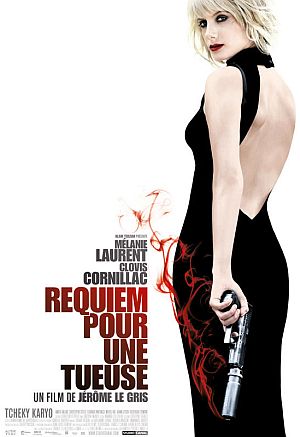 The French have a decent pedigree of action heroines, going back to Joan of Arc. Cinematically, the likes of Bloody Mallory, Adele Blanc-Sec, and one of the most influential of them all, Nikita, have kept the tricouleur flying. This is closest to the last-named, with Lucrece (Laurent) fed up of the assassin game, but talked into that old standby of the genre, one final mission, by her agent (Karyo, who of course was also in Nikita). This involves posing as a classical singer and taking part in a performance of Handel’s Messiah. For the target is the bass singer (Stills), whose Scottish distillery occupies land an oil company wants for their pipeline. Lucrece is pretty disenchanted with the whole thing, and this may explain why her early attempts mis-fire. Fortunately, the special agent (Cornillac) sent to track her down, is equally as unenthusiastic. But is Lucrece the only killer in play?
The French have a decent pedigree of action heroines, going back to Joan of Arc. Cinematically, the likes of Bloody Mallory, Adele Blanc-Sec, and one of the most influential of them all, Nikita, have kept the tricouleur flying. This is closest to the last-named, with Lucrece (Laurent) fed up of the assassin game, but talked into that old standby of the genre, one final mission, by her agent (Karyo, who of course was also in Nikita). This involves posing as a classical singer and taking part in a performance of Handel’s Messiah. For the target is the bass singer (Stills), whose Scottish distillery occupies land an oil company wants for their pipeline. Lucrece is pretty disenchanted with the whole thing, and this may explain why her early attempts mis-fire. Fortunately, the special agent (Cornillac) sent to track her down, is equally as unenthusiastic. But is Lucrece the only killer in play? ★★★★
★★★★ Mark (Lemaire), is a thief on the run from his collaborators after absconding with the loot. He takes refuge in a remote country manor, all but surrounded by water, which he believes to be deserted. Turns out he was almost right. The sole inhabitants are a pair of chambermaids, Eva (Lahaie) and Elizabeth (Mai), but despite his gun, they don’t seem quite as terrified of the intruder as one feels they should be, and tell him they are expecting some other female visitors later that evening. Elizabeth does take a shine to Mark, and tells him he should leave, but Eva uses her wiles to keep Mark there. The rest of his gang show up, and lay siege to the house, but Eva takes the loot out to them and single-handedly dispatches them, before returning to the manor. As night descends, the visitors finally arrive, and the noose tightens around Mark’s neck, as the truth about the get-together is revealed…
Mark (Lemaire), is a thief on the run from his collaborators after absconding with the loot. He takes refuge in a remote country manor, all but surrounded by water, which he believes to be deserted. Turns out he was almost right. The sole inhabitants are a pair of chambermaids, Eva (Lahaie) and Elizabeth (Mai), but despite his gun, they don’t seem quite as terrified of the intruder as one feels they should be, and tell him they are expecting some other female visitors later that evening. Elizabeth does take a shine to Mark, and tells him he should leave, but Eva uses her wiles to keep Mark there. The rest of his gang show up, and lay siege to the house, but Eva takes the loot out to them and single-handedly dispatches them, before returning to the manor. As night descends, the visitors finally arrive, and the noose tightens around Mark’s neck, as the truth about the get-together is revealed…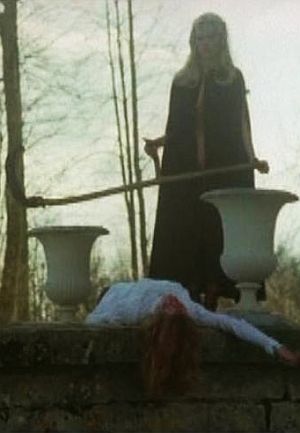 Watching porn stars try to act is often a painful experience, but renowned 70’s XXX starlet Lahaie is perfectly cast here. She plays a feral creature, driven entirely by instinct, and with no qualms about using sex or violence to achieve her aim, of keeping Mark in the house for the night. The sight of her stalking across the bridge which forms the castle’s sole entrance, wielding a blood-stained scythe almost the same size as the actress, is one that will stick with you. The film does betray its cheapness with some fairly crappy effects [you’re going to have someone hacked apart with a scythe, you should do better than some red gunk on the throat], but more than makes up for it with a parade of strong, confident and sensual female characters. Mark is by no means an idiot or a weakling, but from the moment he arrives in the house, it’s clear he’s completely beyond his depth, out-maneouvered at every turn by the women.
Watching porn stars try to act is often a painful experience, but renowned 70’s XXX starlet Lahaie is perfectly cast here. She plays a feral creature, driven entirely by instinct, and with no qualms about using sex or violence to achieve her aim, of keeping Mark in the house for the night. The sight of her stalking across the bridge which forms the castle’s sole entrance, wielding a blood-stained scythe almost the same size as the actress, is one that will stick with you. The film does betray its cheapness with some fairly crappy effects [you’re going to have someone hacked apart with a scythe, you should do better than some red gunk on the throat], but more than makes up for it with a parade of strong, confident and sensual female characters. Mark is by no means an idiot or a weakling, but from the moment he arrives in the house, it’s clear he’s completely beyond his depth, out-maneouvered at every turn by the women.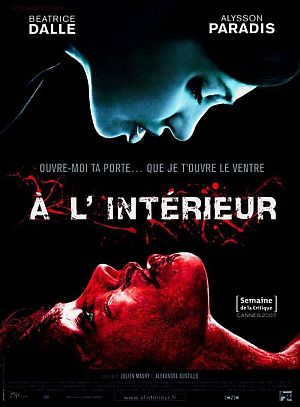
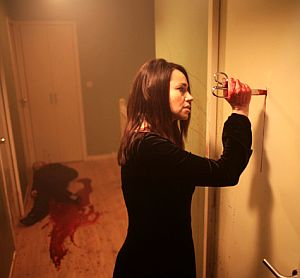 Let me be perfectly clear: this is hardcore horror of the most unrelenting sort, completely unsuitable for those of a nervous disposition, and particularly pregnant women. In the 1980’s, Dalle was a sexpot, for her role in Betty Blue, but you can flush all memory of that down the toilet: here, she has a feral, near-demonic intensity, and god help anyone who is unfortunate enough to get in her way. Particularly the men, who are disposed of with complete dispassion and brutality; as the film goes on, her relationship with Sarah becomes complex, and more a case of, “I’m taking your baby, and we can do this the hard way or… Well, really, that’s all there is. Sorry.” Friends, family, even an entire patrol of cops – no-one can help Sarah. She’s completely on her own, and her fate is entirely in her own hands.
Let me be perfectly clear: this is hardcore horror of the most unrelenting sort, completely unsuitable for those of a nervous disposition, and particularly pregnant women. In the 1980’s, Dalle was a sexpot, for her role in Betty Blue, but you can flush all memory of that down the toilet: here, she has a feral, near-demonic intensity, and god help anyone who is unfortunate enough to get in her way. Particularly the men, who are disposed of with complete dispassion and brutality; as the film goes on, her relationship with Sarah becomes complex, and more a case of, “I’m taking your baby, and we can do this the hard way or… Well, really, that’s all there is. Sorry.” Friends, family, even an entire patrol of cops – no-one can help Sarah. She’s completely on her own, and her fate is entirely in her own hands.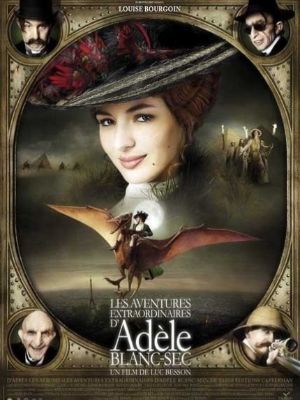 Good to see Besson back in the director’s chair. Outside of the kids’ Arthur series, the only movie he personally helmed in the 2000’s was Angel-A, but Besson has been delivering action heroines for 20 years. Most obviously with the hugely-influential Nikita, but also in The Messenger and, to some extent The Fifth Element and Leon. Here, he goes back to just before the first World War, where journalist Adèle Blanc-Sec (Bourgoin) is kinda like a proto-Lara, whizzing around the globe in search of adventure. She heads to Egypt to grab the mummy belonging to Ramses’s physician: she’s been working with Prof. Ménard (Nahon), who has discovered how to bring the dead back to life, and wants to use the arcane knowledge the mummy possesses to help her sister, who has been in a coma for five years. But Ménard, unwilling to wait, tests his powers on a prehistoric egg: the resulting pterodactyl escapes from the museum where it is housed, and terrorizes Paris. Detective Caponi (Lellouche) is on that case…
Good to see Besson back in the director’s chair. Outside of the kids’ Arthur series, the only movie he personally helmed in the 2000’s was Angel-A, but Besson has been delivering action heroines for 20 years. Most obviously with the hugely-influential Nikita, but also in The Messenger and, to some extent The Fifth Element and Leon. Here, he goes back to just before the first World War, where journalist Adèle Blanc-Sec (Bourgoin) is kinda like a proto-Lara, whizzing around the globe in search of adventure. She heads to Egypt to grab the mummy belonging to Ramses’s physician: she’s been working with Prof. Ménard (Nahon), who has discovered how to bring the dead back to life, and wants to use the arcane knowledge the mummy possesses to help her sister, who has been in a coma for five years. But Ménard, unwilling to wait, tests his powers on a prehistoric egg: the resulting pterodactyl escapes from the museum where it is housed, and terrorizes Paris. Detective Caponi (Lellouche) is on that case…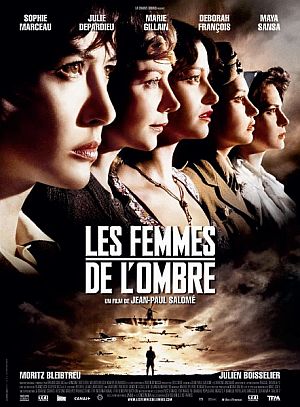
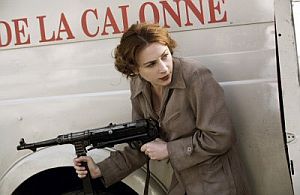 It’s a solid piece of action/drama, which managed to keep both of us awake, despite a session earlier in the evening at the “all you can eat” fish fry; normally, that requires 30,000 Volts to keep us from sliding into post-gluttony unconsciousness. I think Chris enjoyed the movie a little more: I was somewhat on the fence about giving it the seal, finding some of the plotting a little convoluted and occasionally implausible, but her endorsement of this as “great” provided sufficient impetus. Marceau is particularly good, exuding steely resolve to hold the team together, and Bleibtreu makes an excellent foil, coming across as equally smart and committed as Louise. Their conflict is the glue that binds the story together, and makes it one of the best efforts in the wartime heroine genre to date.
It’s a solid piece of action/drama, which managed to keep both of us awake, despite a session earlier in the evening at the “all you can eat” fish fry; normally, that requires 30,000 Volts to keep us from sliding into post-gluttony unconsciousness. I think Chris enjoyed the movie a little more: I was somewhat on the fence about giving it the seal, finding some of the plotting a little convoluted and occasionally implausible, but her endorsement of this as “great” provided sufficient impetus. Marceau is particularly good, exuding steely resolve to hold the team together, and Bleibtreu makes an excellent foil, coming across as equally smart and committed as Louise. Their conflict is the glue that binds the story together, and makes it one of the best efforts in the wartime heroine genre to date.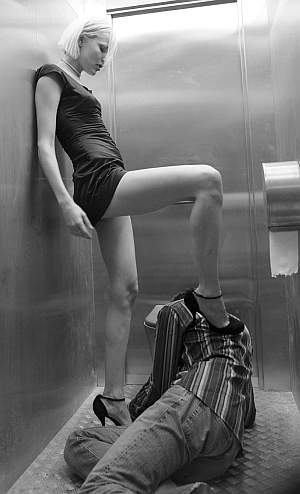 Andre (Debbouse) is at the end of his tether, owing large amounts of money to at least three separate gangs. He decides to end it all by leaping off a Parisian bridge into the Seine below, but is beaten to it by the tall, leggy blonde, Angela (Rasmussen, who you may remember in a bathroom stall with Rebecca Romijn-Stamos in the opening of Femme Fatale). His suicide forgotten, he jumps in to save her, and as they sit, dripping on the river-bank she vows that she will repay his selfless act by taking care of him. This may not be quite the way he expects; for example, she hijacks a negotiation with one of the mobsters to whom Andre owes money, marches upstairs and emerges not long afterwards, the debt apparently forgiven and with tens of thousands in bonus cash. Just as important as resolving his pecuniary problems are the emotional ones which plague Andre, and Angela is perhaps even more adept at addressing those: his lack of self-confidence, trust issues, an inability to give or receive love and so on. She sees the good person who is buried
Andre (Debbouse) is at the end of his tether, owing large amounts of money to at least three separate gangs. He decides to end it all by leaping off a Parisian bridge into the Seine below, but is beaten to it by the tall, leggy blonde, Angela (Rasmussen, who you may remember in a bathroom stall with Rebecca Romijn-Stamos in the opening of Femme Fatale). His suicide forgotten, he jumps in to save her, and as they sit, dripping on the river-bank she vows that she will repay his selfless act by taking care of him. This may not be quite the way he expects; for example, she hijacks a negotiation with one of the mobsters to whom Andre owes money, marches upstairs and emerges not long afterwards, the debt apparently forgiven and with tens of thousands in bonus cash. Just as important as resolving his pecuniary problems are the emotional ones which plague Andre, and Angela is perhaps even more adept at addressing those: his lack of self-confidence, trust issues, an inability to give or receive love and so on. She sees the good person who is buried 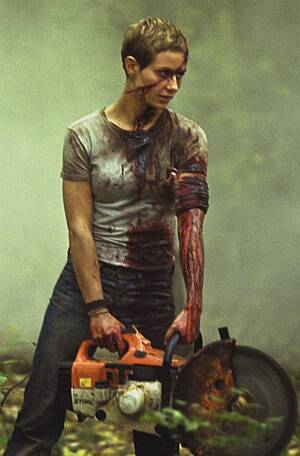 This Thanksgiving viewing – that may say more about our house than anything – was a suggestion by our teen daughter, which is somewhere between a incentive and a put-off. Normally, she won’t view anything with subtitles for more than two minutes; but her tastes are closer to Anchorman or The Notebook than French slasher pics. Reviews I read in advance were similarly split: either enthusiastic hype (“arguably the best horror movie since The Blair Witch Project” wrote
This Thanksgiving viewing – that may say more about our house than anything – was a suggestion by our teen daughter, which is somewhere between a incentive and a put-off. Normally, she won’t view anything with subtitles for more than two minutes; but her tastes are closer to Anchorman or The Notebook than French slasher pics. Reviews I read in advance were similarly split: either enthusiastic hype (“arguably the best horror movie since The Blair Witch Project” wrote  Despite influences all over the place – Assault on Precinct 13, Aliens, Night of the Living Dead, The Magnificent Seven – Siri takes and runs with them very effectively. Laborie (Farès) is a career soldier, tasked with transporting an Albanian gangster to his trial; but the convoy is ambushed, so she and her men hole up in a nearby warehouse on a deserted industrial estate. However, it is being robbed by brothers Santino (Magimel) and Nasser (Naceri), plus their crew – and the attackers have also followed them, intent on rescuing their boss. Can they survive until help arrives?
Despite influences all over the place – Assault on Precinct 13, Aliens, Night of the Living Dead, The Magnificent Seven – Siri takes and runs with them very effectively. Laborie (Farès) is a career soldier, tasked with transporting an Albanian gangster to his trial; but the convoy is ambushed, so she and her men hole up in a nearby warehouse on a deserted industrial estate. However, it is being robbed by brothers Santino (Magimel) and Nasser (Naceri), plus their crew – and the attackers have also followed them, intent on rescuing their boss. Can they survive until help arrives?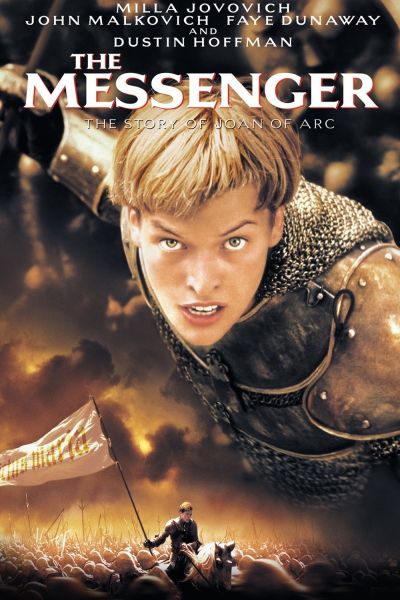
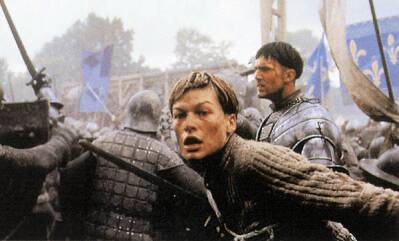 Joan’s capture, trial and execution are fairly close to the truth, though in reality, the King was less involved and more concerned for Joan than shown. It certainly is reasonable to suggest that a naive innocent such as Joan would have been used for political ends. Once she’d outlasted her usefulness – and with the king on the throne, she quickly became more a hindrance than a help – she would have needed to be disposed of. Must confess, I quite like the concept of Joan as a medieval version of Lee Harvey Oswald. Dustin Hoffman’s appearance as Joan’s conscience is another neat touch, and his sarcasm works well. Indeed, the film is one good performance from being excellent. The bad news is, it’s Jovovich who is the culprit (a messenger who deserves to be shot?), though Besson and co-writer Andrew Birkin perhaps warrant most of the criticism for twisting facts and characters in order to fit a predetermined goal. Their Joan is so far from the historical record, they’d have been better off placing their character in an entirely fictitious setting.
Joan’s capture, trial and execution are fairly close to the truth, though in reality, the King was less involved and more concerned for Joan than shown. It certainly is reasonable to suggest that a naive innocent such as Joan would have been used for political ends. Once she’d outlasted her usefulness – and with the king on the throne, she quickly became more a hindrance than a help – she would have needed to be disposed of. Must confess, I quite like the concept of Joan as a medieval version of Lee Harvey Oswald. Dustin Hoffman’s appearance as Joan’s conscience is another neat touch, and his sarcasm works well. Indeed, the film is one good performance from being excellent. The bad news is, it’s Jovovich who is the culprit (a messenger who deserves to be shot?), though Besson and co-writer Andrew Birkin perhaps warrant most of the criticism for twisting facts and characters in order to fit a predetermined goal. Their Joan is so far from the historical record, they’d have been better off placing their character in an entirely fictitious setting.